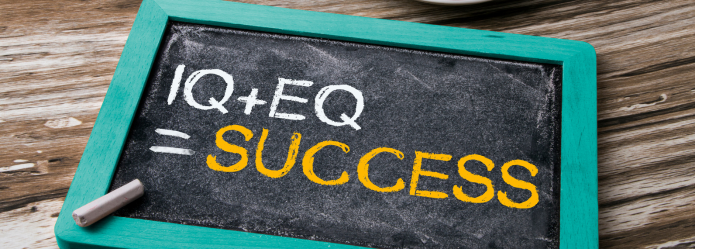4333 Monroe Street
Suite F & G
Toledo, Ohio 43606
419-724-4973 Office
419-724-4974 Fax
info@hypeoflucas.com
Mental Health Monday: Understanding Emotional Intelligence: A Key Skill for Your Child’s Mental Health
Why EQ Matters Just as Much as IQ

In today's fast-paced, achievement-oriented society, IQ (Intelligence Quotient) often garners the spotlight as the key indicator for predicting a child's future success. Yet, at H.Y.P.E, we firmly stand by the importance of EQ (Emotional Intelligence) as an equally crucial factor in your child's holistic development. This dual emphasis on EQ and IQ provides a balanced framework for the mental and emotional growth of children. At H.Y.P.E, we understand the importance of EQ in the holistic well-being of the children we serve. Read on to learn why EQ matters and how you can support your child’s emotional intelligence at home.
What is Emotional Intelligence?
Emotional Intelligence (EQ) isn't just a buzzword; it's a set of skills that help us perceive, comprehend, manage, and regulate emotions—both our own and those of others. These capabilities lay the groundwork for strong interpersonal relationships, effective communication, and emotional well-being. For instance, a child who can understand their own anger and frustration during a game is more likely to cope better than a child who doesn't recognize these emotions.
These skills are not merely for navigating social playgrounds; they are essential for academic achievements and future career paths. A student with high EQ might work better in group settings, communicate more effectively in class presentations, and deal with stress or challenges in a balanced manner.
The Four Components of EQ
1. Self-Awareness
Self-awareness is the ability to identify and understand one's emotions and their effects. A self-aware child can recognize their feelings and understand why they feel a certain way, helping them to make better choices. For example, if a child realizes they are anxious before a test, they can use relaxation techniques to calm down.
2. Self-Management
Beyond recognizing emotions, self-management involves controlling one's emotions, moods, and reactions. A child with this skill will be less prone to angry outbursts or impulsive actions. For instance, a child who feels overwhelmed by a big project learns to break it down into smaller tasks rather than giving into stress.
3. Social Awareness
Social awareness extends the emotional radar beyond oneself. It enables children to pick up emotional cues from people around them, fostering empathy and understanding. If a child notices that a friend is feeling down, they might offer to talk or give them space, as needed.
4. Relationship Management
This is the skill that enables children to maintain healthy relationships with others. Effective relationship management is rooted in the understanding of one's own and others' emotions, which is built upon the first three components. For example, a child with strong relationship management skills can effectively resolve peer disputes or collaborate well in team projects.
Why EQ is Critical for Children
Emotional Intelligence isn't just a 'nice-to-have' skill; it's a 'must-have' for your child's overall well-being. High EQ leads to improved social interactions, academic success, and emotional balance. It can be especially empowering for children facing behavioral challenges, helping them better manage their emotional responses.
Moreover, EQ plays a significant role in future adulthood—contributing to successful careers, healthy relationships, and mental well-being. For instance, a child with high EQ grows up to be an adult who can manage work-related stress better and form more meaningful relationships.
How H.Y.P.E Supports EQ Development
At H.Y.P.E, our case managers and therapists collaborate to provide a comprehensive support system that emphasizes Emotional Intelligence. By analyzing day-to-day emotional triggers and responses, we tailor individualized strategies that promote EQ growth, like teaching coping mechanisms for emotional regulation.
Our holistic approach doesn't just tackle behavioral symptoms; it goes deeper to address the emotional roots, nurturing a more resilient and emotionally intelligent young person. Through initiatives like skill-building workshops and one-on-one coaching, we cultivate these critical emotional skills in our clients.
Tips for Parents to Enhance EQ at Home
- Open Communication
Encouraging open communication about emotions can work wonders. Use family discussions or one-on-one conversations as a safe space for your child to express feelings. This setting offers a practical example where children can learn to name their emotions, making them easier to manage.
- Modeling Behavior
Children often look to adults for cues on how to behave, making you their most influential role model. If you deal with your emotions in a healthy manner—say, taking deep breaths when angry instead of shouting—you're teaching them to do the same.
- Positive Reinforcement
Positive reinforcement like praises, rewards, or even simple acknowledgments can go a long way in encouraging emotionally intelligent behavior. If your child shows empathy or effectively manages a difficult emotion, acknowledging this helps cement these vital skills.
The Road Ahead
As champions of youth behavioral health and community uplift, H.Y.P.E is committed to a 360-degree approach to your child's well-being. Our ultimate goal extends beyond treating behavioral symptoms; we aim to equip your child with the emotional tools they'll require for life.
Thank you for joining us for this Mental Health Monday. We hope you've gained valuable insights into the importance of Emotional Intelligence for your child’s mental health. Remember, fostering EQ is a lifelong journey, and H.Y.P.E is here to support you and your child every step of the way. Until next Monday, take good care of yourself and those around you!




